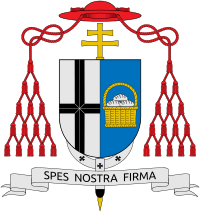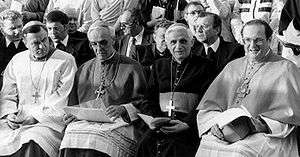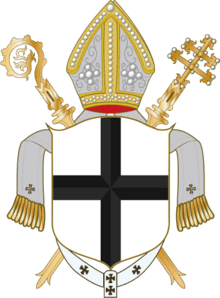Joachim Meisner
Joachim Meisner (25 December 1933 – 5 July 2017) was a German cardinal of the Catholic Church. He was the immediate past Archbishop of Cologne, serving from 1989 until his resignation was accepted by Pope Francis in 2014. He previously served as Bishop of Berlin from 1980 to 1989, and was created a cardinal in 1983. He was widely considered to be Germany's leading conservative Roman Catholic figure.[1]
Joachim Meisner | |
|---|---|
| Cardinal, Archbishop Emeritus of Cologne | |
.jpg) Meisner in 2014 | |
| Church | Cologne Cathedral |
| Archdiocese | Cologne |
| Province | Cologne |
| Metropolis | Cologne |
| See | Cologne |
| Appointed | 20 December 1988 |
| Installed | 12 February 1989 |
| Term ended | 28 February 2014 |
| Predecessor | Joseph Höffner |
| Successor | Rainer Woelki |
| Other posts | Cardinal-Priest of Santa Pudenziana (1983–2017) |
| Orders | |
| Ordination | 22 December 1962 by Josef Freusberg |
| Consecration | 17 May 1975 by Hugo Aufderbeck |
| Created cardinal | 2 February 1983 by Pope John Paul II |
| Rank | Cardinal-Priest |
| Personal details | |
| Born | 25 December 1933 Breslau, Prussia, German Reich (now Wrocław, Poland) |
| Died | 5 July 2017 (aged 83) Bad Füssing, Bavaria, Germany |
| Nationality | German |
| Denomination | Roman Catholic |
| Previous post |
|
| Motto |
|
| Coat of arms |  |
| Styles of Joachim Meisner | |
|---|---|
 | |
| Reference style | His Eminence |
| Spoken style | Your Eminence |
| Informal style | Cardinal |
| See | Cologne |
Early life and ordination
Meisner was born in Breslau, Germany (modern Wrocław, Poland).[2] He studied in East Germany at the seminary of Erfurt from 1959 to 1962,[2] and was ordained a deacon on 8 April 1962.[3] On 22 December 1962, he was ordained to the priesthood by Bishop Josef Freusberg, an auxiliary bishop of the Diocese of Fulda.
Between 1963 and 1975, Meisner served as chaplain at St. Giles Parish in Heiligenstadt and Holy Cross Parish in Erfurt.[2] He also served as diocesan director of Caritas.[3] During his pastoral ministry, he studied at the Pontifical Gregorian University in Rome, earning his doctorate of theology in 1969.
Bishop

In 1975, he was elected titular Bishop of Vina and auxiliary bishop to the Apostolic Administrator Erfurt-Meiningen. He was elected as a delegate to the Fourth Synod of Bishops at the Vatican in 1977, where he renewed a friendship with Karol Wojtyła, who in 1980 as Pope John Paul II appointed Meisner Bishop of Berlin and made him Cardinal-Priest of Santa Pudenziana in the consistory of 2 February 1983.[4]
In 1988 after the death of Joseph Höffner, Meisner was named Archbishop of Cologne, a post he continued to hold until he retired. He was one of the cardinal electors who participated in the 2005 papal conclave that selected Pope Benedict XVI. Meisner was the bishop in charge for the XX. World Youth Day in August 2005 in the archdiocese in Cologne that attracted more than one million people.
On 18 September 2012, Meisner was appointed by Pope Benedict XVI as a Synod Father for the October 2012 Ordinary General Assembly of the Synod of Bishops.[5]
In January 2013, two Catholic hospitals refused to provide a "morning after pill" to a rape victim based on Church policy that treats such medications as abortifacients. Meisner apologized and approved the use of some such pills for rape victims based on the belief that they prevented fertilization and did not induce abortion. He said that if "a medication that hinders conception is used after a rape with the purpose of avoiding fertilization, then this is acceptable in my view."[6] The German Bishops' Conference endorsed his policy on 21 February, distinguishing between different types of morning after pills.[7]
Meisner participated in the 2013 papal conclave that elected Pope Francis.[8] At Pope Francis' inauguration, Meisner was one of the six cardinals who made the public act of obedience on behalf of the College of Cardinals.[lower-alpha 1][9][10]
On 25 December 2013, Cardinal Meisner turned 80 and lost the right to participate in future conclaves and he submitted his resignation, which Pope Francis accepted on 28 February 2014.[11] Diocesan administrator Stefan Heße led the archdiocese until a successor, Rainer Woelki, was appointed on 11 July and installed as Archbishop on 20 September 2014.[12]
Meisner died on 5 July 2017 while vacationing in Bad Füssing in Bavaria.[13]
Views
Papacy and Magisterium
Meisner was known for his support of the Pope and of the teachings of the Church. Pope John Paul asked for Cardinal Meisner to see him when he was in the Gemelli Hospital in Rome. Meisner had a very close relationship to Pope John Paul II and was a long-time friend of Joseph Ratzinger, later Pope Benedict XVI.[14]
He said that Benedict "has the intelligence of 12 professors and is as pious as a child on the day of his first communion."[15]
In 2009, Meisner "approached [Pope] Benedict on behalf of a number of cardinals to ask him to dump his Secretary of State, Italian Cardinal Tarcisio Bertone."[16][17] "According to the interview in the Frankfurter Rundschau, Meisner told Benedict: 'Your Holiness, you have to make Cardinal Bertone resign! He has the responsibility, like in a secular government.'[17][lower-alpha 2] According to Meisner, Benedict's response was: 'Listen to me carefully. Bertone will remain! Enough, enough, enough.'"[17][lower-alpha 3]
Culture and liturgy
"Wherever culture is separated from the worship of God, cult atrophies in ritualism and culture becomes degenerate", said Meisner at the blessing of his own archdiocese's new art museum, the Kolumba, on 14 September 2007. His choice of words recalled the phrase "entartete Kunst" ("degenerate art") used as the title of the exhibition opened by Adolf Hitler in Munich on 19 July 1937 and provoked strong negative reaction.[lower-alpha 4]
It was widely recognized that Meisner was criticizing the stained-glass window in Cologne Cathedral by Gerhard Richter, which was unveiled just weeks before and of which he disapproved.[19][20][21]
Amoris laetitia
In April 2016, Pope Francis issued the apostolic exhortation Amoris laetitia. Meisner and three other cardinals (Carlo Caffarra, Walter Brandmüller and Raymond Leo Burke) submitted dubia (doubts) in private, followed by a public letter ("Seeking Clarity: A Plea to Untie the Knots in Amoris Laetitia") in November 2016, asking Francis to clarify various points of doctrine. The first dubia asked about the reception of the sacraments by the divorced and remarried. The public letter asked about fundamental issues of the Christian life and referenced Pope John Paul II's encyclical Veritatis splendor.[22][23] In April 2017, following no reply to their letter, the cardinals requested a meeting with Francis, but there had been no response to this request by June 2017.[24]
While waiting for a response from Francis, Pope Emeritus Benedict wrote a letter complimentary of Cardinal Meisner, in spite of the latter being "a fierce critic of Francis who spoke out against the pontiff allowing remarried divorcees to receive holy communion", according to The Guardian.[25]
Select published works
- Die Fürstin und der Kardinal: Ein Gespräch über Glauben und Tradition, with Princess Gloria of Thurn and Taxis (Verlag Herder, 2008) ISBN 9783451298714[26]
Notes
- The other five cardinals were Giovanni Battista Re, Tarcisio Bertone, Jozef Tomko, Renato Raffaele Martino and Francesco Marchisano. Cardinals Re and Bertone represented the cardinal-bishops; Cardinals Martino and Marchisano represented the cardinal-deacons; and Cardinal Meisner himself along with Cardinal Tomko represented the cardinal priests.
- Heiliger Vater, Sie müssen Kardinal Bertone entlassen! Er ist der Verantwortliche – ähnlich wie der zuständige Minister in einer weltlichen Regierung.[16]
- Hör mir gut zu! Bertone bleibt! Basta! Basta! Basta![16]
- Although the Cardinal said his meaning was "that when art and religion are separated, both are damaged", and a spokesman for him said he had not intended to pay tribute to "old ideologies", a writer for an Internet site that describes itself as "the Internet platform against extremism of the right" accused him of using Goebbels-like incendiary language against artists, in a cowardly attack by one who "has control over a huge and wealthy empire that includes property, church media and the allegiance of millions of believers" against those who "are vulnerable within society: generally isolated, badly paid and rarely organized into trade unions or powerful professional bodies".[18]
References
- "Daniel-in-lion's-den moment for new Catholic archbishop of free-wheeling Berlin". Reuters. 5 July 2011.
- "MEISNER Card. Joachim". Holy See.
- "MEISNER, Joachim (1933– )". The Cardinals of the Holy Roman Church.
- Kamm, Henry (3 February 1983). "Pope Paul Installs 18 as Cardinals". New York Times. Retrieved 16 January 2017.
- Wensierski, Peter; Bohr, Felix (11 October 2012). "Ratzingers Abkehr vom Rebellentum". Der Spiegel (in German). Retrieved 5 July 2017.
- Uebbing, David (7 February 2013). "Doctor says Cardinal Meisner's contraception statement was manipulated". Catholic News Agency. Retrieved 5 July 2017.
- "Church Officials Address Morning After Pills in Rape Cases". America. 28 February 2013. Retrieved 5 July 2017.
- "List of potential cardinal-electors for a papal conclave". Catholic Telegraph. Catholic News Service. 11 February 2013. Retrieved 5 July 2017.
- Rolandi, Luca (19 March 2013). "Il giorno di Papa Francesco: La messa di inizio pontificato in Piazza San Pietro" (in Italian). Archived from the original on 8 August 2017. Retrieved 15 October 2013.
- Inaugural Mass of the Pontificate (Vatican video of Pope Francis' papal inauguration on YouTube
- "MEISNER, Joachim". Salvador Miranda. Retrieved 4 January 2014.
- "Prälat Heße leitet das Erzbistum in der Zeit der Vakanz" (Press release) (in German). 28 February 2014. Retrieved 17 January 2017.
- "Joachim Meisner, retired Cologne archbishop, dies at 83". Washington Post. Associated Press. 5 July 2017. Retrieved 5 July 2017.
- Cardinal Joachim Meisner, one of four 'dubia’ cardinals, dies at age 83, Catholic News Agency, 7 July 2017
- Tara Holmes: Benedict XVI, BBC, 6 August 2009
- Frank, Joachim (11 February 2013). "Kardinal Joachim Meisner: Wie soll das gehen? Ein Papst im Ruhestand!" (in German). Frankfurter Rundschau. Retrieved 28 May 2014.
- Allen, John L. Jr. (15 February 2013). "A critical tone among cardinals begins to emerge". National Catholic Reporter. Retrieved 20 February 2014.
- Margolis, Karen Margolis. "Watch their words. Meisner & Herman, the German backwards crusaders".
- Fortini, Amanda (9 December 2007). "Pixelated Stained Glass". New York Times. Retrieved 14 November 2016.
- "Gerhard Richter weist Meisners Kritik zurück". Die Welt (in German). 31 August 2007. Retrieved 14 November 2016.
- "Window by Artist Gerhard Richter Unveiled at Cologne Cathedral". Deutsche Welle. 27 August 2007. Retrieved 14 November 2016.
- Pentin, Edward (14 November 2016). "Four Cardinals Formally Ask Pope for Clarity on 'Amoris Laetitia'". National Catholic Register. Retrieved 15 November 2016.
- McElwee, Joshua J. (14 November 2016). "Four cardinals openly challenge Francis over 'Amoris Laetitia'". National Catholic Reporter. Retrieved 15 November 2016.
- Pentin, Edward (19 June 2017). "Dubia Cardinals Seek Papal Audience". National Catholic Register. Retrieved 5 July 2017.
- "Two popes, plotting cardinals and the fallout of an explosive book". The Guardian. 19 January 2020. Retrieved 19 January 2020.
- Broder, Henryk M. (12 September 2008). "Fromme Fürstin, knallharter Kardinal". Der Spiegel (in German). Retrieved 5 July 2017.
External links
| Wikimedia Commons has media related to Joachim Meisner. |
| Catholic Church titles | ||
|---|---|---|
| Preceded by Joseph Höffner |
 Archbishop of Cologne 1989–2014 |
Succeeded by Rainer Woelki |
| Preceded by Gerhard Schaffran |
Chairman of the German Bishops' Conference 1982–1988 |
Succeeded by Joachim Wanke |
| Preceded by Alfred Bengsch |
 Bishop of Berlin 1980–1988 |
Succeeded by Georg Sterzinsky |